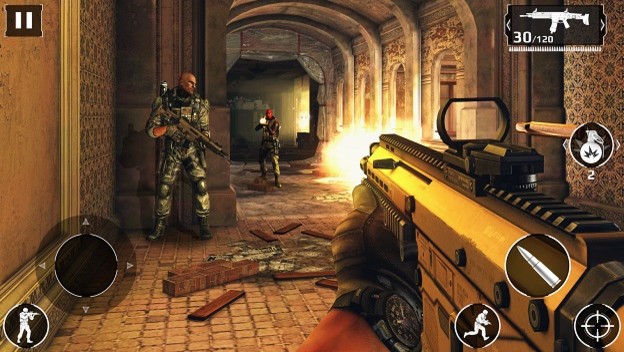When it comes to developing modern, hard-hitting games for smartphones and tablets, there are few developers as influential or as successful as Gameloft. Gameloft does it all: it has a Call of Duty style franchise in Modern Combat with hundreds of millions of downloads, a wildly successful Halo- style franchise in Nova, and for the Need for Speed freaks who can’t get enough arcade racing action, there’s Asphalt. In addition, Gameloft is capitalizing on some very lucrative licensing deals with Marvel, Disney, the NFL and more. This is a powerhouse publisher that sees over a million downloads of its games every single day.
Gameloft’s Nicolas Pochez thinks that mobile gaming is the next big thing, destined not only to thrive, but to compete with your consoles for big-screen dominance. “If I was to be bold, I would say that mobile gaming has overtaken console gaming, but it depends on the machine,” he said at OMD UK’s Innovation Week (thanks, TechRadar ). “Looking at smartphones today, some are faster than three-year-old PCs.” Those of us who have the disposable income to throw at modern consoles and gaming PCs are likely using smartphones and tablets as well. Have you ever stopped to think about how convenient most service providers make it to upgrade your phone on a regular basis for little to no cost?
Consider the average lifespan of consoles in contrast. The Xbox 360 was released in 2005, and it was almost nine years before we got our hands on a $500 upgrade in the Xbox One. With the most popular plans from providers like Verizon and Sprint, subscribers are able to upgrade to the very latest phones and tablets annually or, at the most, every two years for $100 or less. Considering the memory, displays, dedicated graphics chips, and advanced processors that come standard on these devices, what you’re really getting every year in addition to a phone or tablet is a brand new, highly capable gaming device.
It wasn’t until very recently that I began to look at my phone and my tablet as gaming devices. Like most of you, I just assumed that as far as games go, Candy Crush and Clash of Clans were about as deep as things get on smart devices, and real games, as ever, remain on consoles and handhelds. Two things changed my mind, and now I’m beginning to see that the hardcore gaming community has been largely overlooking the most promising frontier in the future of gaming. Those two things were Hearthstone and FPse.

When I put my PC into sleep mode and started taking Hearthstone to my bedroom, seamlessly picking up and playing online matches with my friends, I started to come around to the fact that developers and publishers really can give you fully featured experience on your mobile devices. Then I gave FPse a shot. FPse is a popular PlayStation emulator, and I’m blown away by how perfectly and how smoothly it runs on my Nexus 7 tablet. In no time at all I had a PS3 controller synced up via Bluetooth and was playing one of my favorite fighting games of all time, Rival Schools, without a hitch. According to reviews, FPse has been working flawlessly for years, on hardware much older than mine. If smartphones have been flawlessly emulating good-looking 3D games for a long time, what are they capable of running natively?
Quite a lot, as it turns out. Games like Gameloft’s Modern Combat 5 sport crisp, HD visuals and robust, 6 on 6 online multiplayer, and with streaming devices like Apple TV, Chromecast, and Amazon Fire TV, these games look great and run smoothly on the big screen. We’re right on the verge of experiencing AAA games that we can play in the living room as well as on the bus. We’re not quite there yet, but it’s only a matter of time. Publishers whose roots run deep in console gaming are acknowledging this, and we’d be wise to do the same. Activision, EA, and Nintendo are all aggressively investing in the future of mobile gaming, and I’m beginning to wonder if consoles taking an eventual backseat sounds so farfetched after all.
